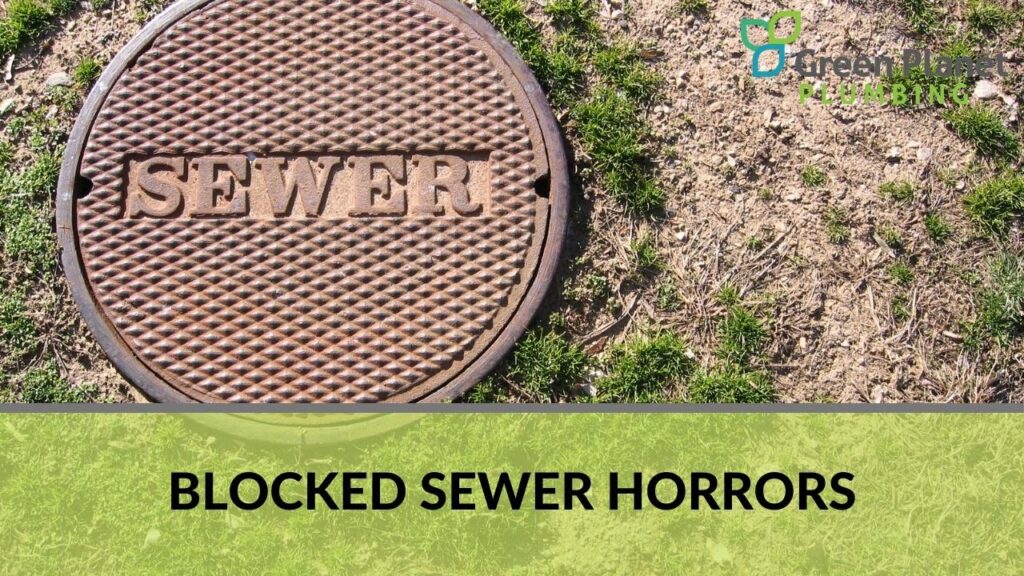Call your trusted Newcastle plumber to remedy the situation immediately!
There is no other way to put it. Blocked sewers are one of the scariest ingredients of a horror story. It’s perhaps more terrifying than Pennywise lurking in the gully! Thankfully, regular plumbing maintenance can help homeowners reduce the occurrence of blockages and other serious problems, but even then, problems can still occur sometimes.
Being plagued by blockages and clogs can be a real headache; a continuous flowing sewage system is essential for the household’s comfort, cleanliness, and health, ensuring that waste is properly expelled away from the home and towards wastewater treatment facilities.
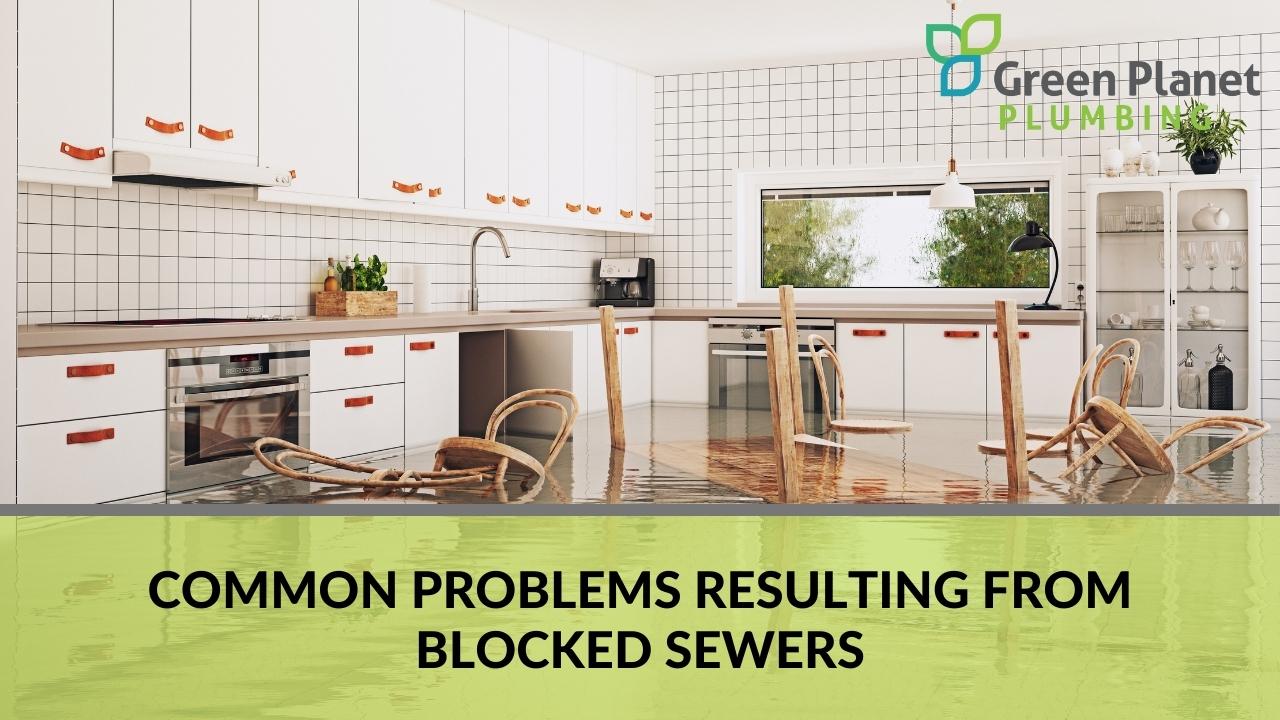
Common problems resulting from blocked sewers
Aside from the obvious discomfort they bring, blocked sewers can cause many problems to all the occupants of the house. The effects of blocked sewers may differ from house to house, but here are some of the common problems they can cause:
- Home structural damage
- Health problems
- Disgusting smells
- Slow drainage
- Home flooding
- Growth of mould and more pests.
Home structural damage
While this damage may not be as glaring as the others in this list, this is probably one of the most serious consequences of having blocked sewers. The backflow of wastewater can cause moisture to seep into the soil and through the foundations.
Stagnant water can also seep through cracks and corners of the house, weakening its structure. If the problem is not resolved as soon as possible, it can lead to more costly repairs and problems.
Health problems
Blocked sewers, as expected, can lead to health issues. Sewage contains harmful bacteria and viruses, and any direct contact with sewage water can lead to illnesses.
Sewer water carries faeces, urine, and other waste from the household. Contact with it can cause viral gastroenteritis, amoebic dysentery, and typhoid. It can even get more dangerous, especially if children and seniors are in the house. Bacteria, viruses, and parasites may even lead to allergic reactions.
Disgusting smells
The home should be a relaxing and healing place. However, a house with a foul smell is simply the opposite of relaxing and healing. Since blocked sewers can result in stagnant water along the sewage lines, this means that wastes and bacteria will accumulate, which can result in a foul smell as the wastes disintegrate, affecting the whole house. Additionally, the occupants of the house may feel nauseous or develop headaches and other health problems.
While low levels of exposure to the gas that emanates from the sewer may not be toxic, high levels of exposure can lead to sewer gas poisoning
Slow drainage
Aside from the unpleasant smell, poor drainage is another obvious sign that the sewer may be blocked. Homeowners will notice slow drainage of water and wastes. This can be quite a bothersome nuisance when wastewater starts going back up.
Clogs may seem simple problems at first. However, if the cause is a blocked sewer, a professional plumber, such as Green Planet Plumbing, if you’re in the Newcastle area of NSW, is needed to fix the issue.
Temporary fixes will provide temporary relief. If the slow drainage still persists, clogs will recur. Soon enough, there will be multiple clogs from different fixtures.
Home flooding
Imagine waking up to a flooded basement, living room, or kitchen. The floodwater is not even clean – it is sewer water. It is basically the stuff that nightmares are made of!
Flooding can damage pieces of furniture, appliances, electronics, flooring, carpets, and other house fixtures and removing the floodwater is a chore in addition to the health problems. Just imagine having to clean the floors and pieces of furniture that were in contact with waste floodwater…
Of course, flooding can also lead to accidents, such as slips and falls. Unsuspecting children or seniors may walk too fast into the wet floor and may end up getting hurt.
Growth of mould and incursion of pests
Blocked sewers can lead to stagnant water which promotes the growth of mould and encourage the presence of pests. Mildew and mould on their own can also cause health problems, such as allergies. Worse, pests can carry viruses and diseases and they can transmit them to members of the household.
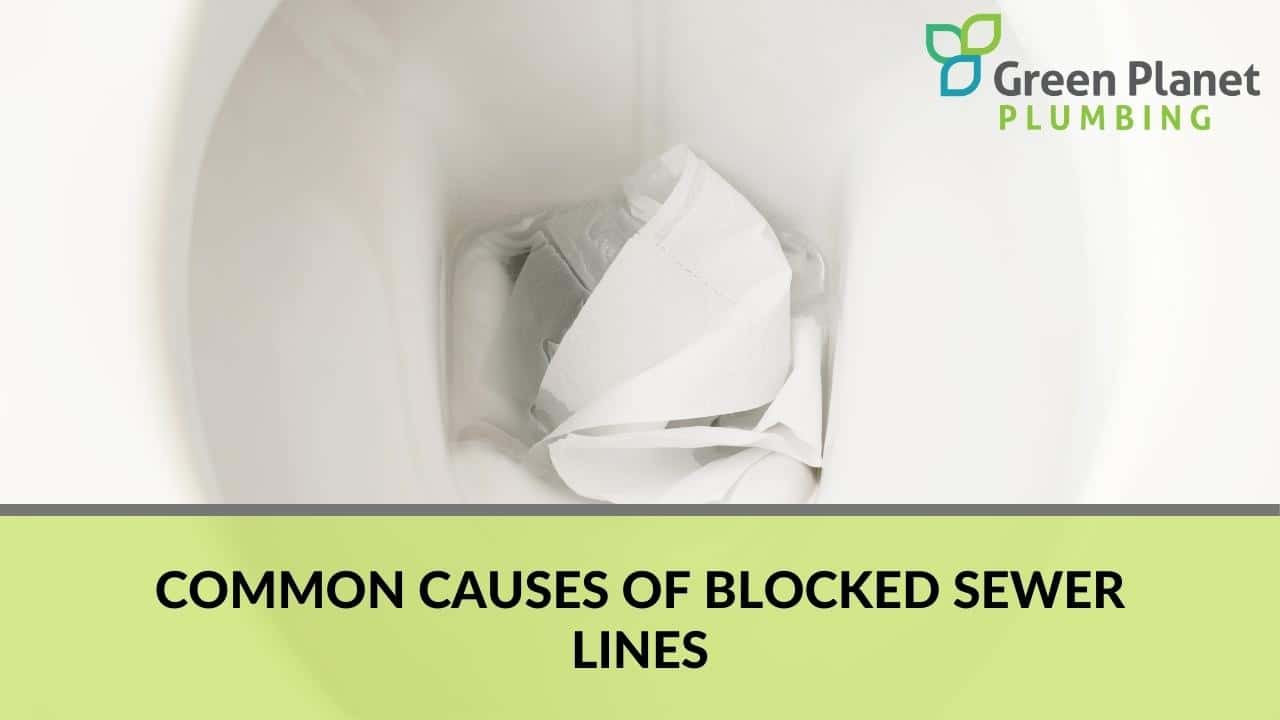
Common causes of blocked sewer lines
So, what are the things that can cause a blocked sewer line? Homeowners should be on the lookout for these things:
- Tree Roots
- Corrosion
- Soil Movement
- Flushing Solids Down the Toilet
- Fats, Oils, and Grease.
Tree Roots
Homeowners should be careful when planting trees and shrubs on their property. Tree and shrub roots are among the most common causes of a blocked sewer line – avoid planting them near the sewer lines. The roots of trees and shrubs may infiltrate the sewer line, which contains organic wastes and water. The invading roots can effectively block the sewer line and may even damage it in the process.
Corrosion
Pipes made of metal will corrode over time. Corrosion is the result of the reactions of the metal with the wastewater that passes through it. Corrosion can cause sections of the sewer line to collapse, resulting in a soil blockage and sewage backup into the house.
Soil movement
The soil that surrounds the sewer line can move and shift. These movements can be due to heavy rains, earthquakes, sinkholes, and heavy construction equipment. The shift in the ground will also move the sewer line – in some instances, the sewer line may sink or sag. Waste materials can accumulate in the sagging part of the line, which can result in a blockage.
Flushing solids down the toilet
Flushing solid waste into the toilet such as used nappies, tampons, tissue paper or wipes, is a big no-no. While these items may go down when flushed with water, they do not disintegrate and break down like organic waste so even flushable wet wipes should go to the trash can, not the toilet. Accumulated solid wastes that do not disintegrate can cause serious clogs and blockages along the sewer lines.
Fats, oils, and grease
Never pour used cooking oils down the sink. Used oils can harden, even if washed away with hot water. Once hardened, these oils can stick to the walls of the sewer line, leading to significant blockage. Therefore, used oil products must be disposed of properly and not thrown into the sink.
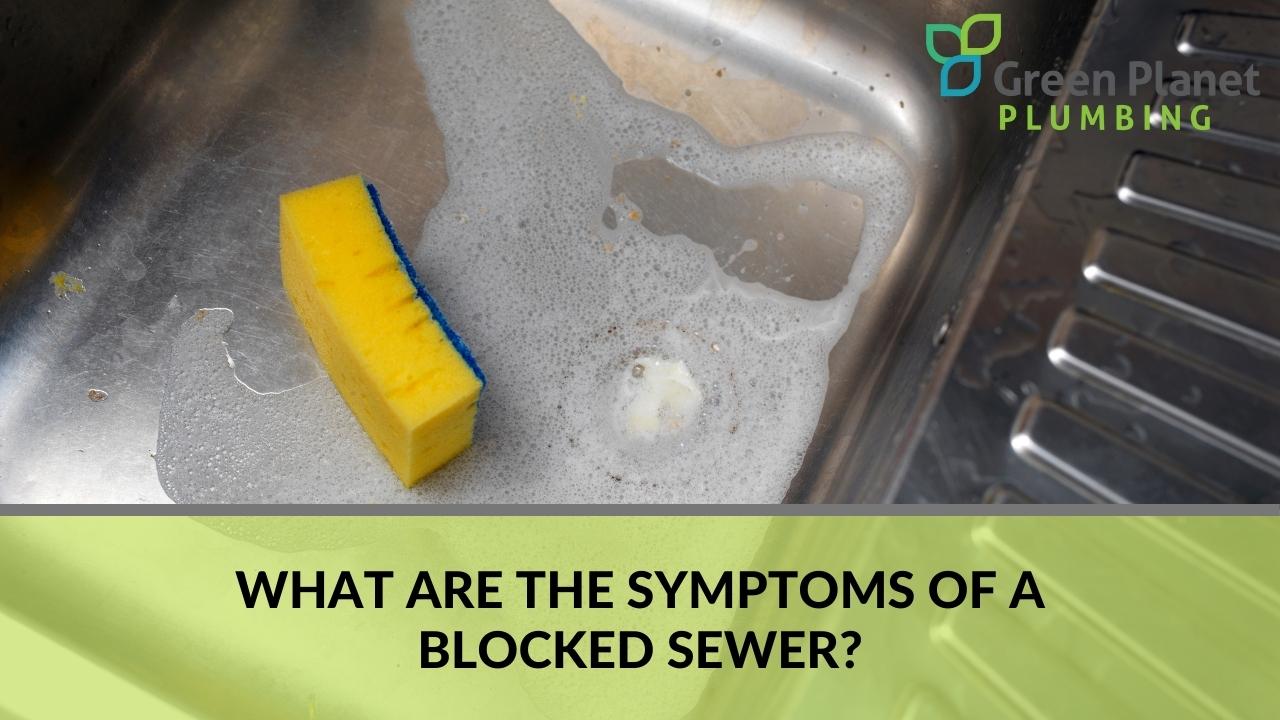
What are the symptoms of a blocked sewer?
Spotting the problem early on makes solving it so much easier. It is essential to be aware of the early signs that the sewage system is not working as it should be. Awareness can help prevent costly disasters that may arise from blocked sewage, such as the following:
- Clogged Toilet
- Slow Draining Sinks
- The Plunger Becomes a Necessity
- Overflowing Toilet.
Clogged toilet
One clogged plumbing fixture is one of the most common early warning signs that the sewer lines may be blocked. Water may start backing up, creating a gurgling sound as it goes out the drain. A clogged toilet can be a nuisance and can cause discomfort to everyone in the house. If the problem indeed is a blocked sewer, then it is just the beginning of a series of horrors with a blocked sewage pipe.
Slow draining sinks
Some may dismiss a slow draining sink as a simple problem that a solvent or a plunger can solve. However, slowly draining sinks, tubs, and toilets may be signs of something wrong with the sewage system. If the drain is still working too slowly after the application of a drain-clearing product, then it may be a problem that only a plumbing professional can solve.
The plunger becomes a necessity
Using the plunger during almost every toilet use is a sure sign of a plumbing problem. The problem may be down along the sewer line, where there can be blockages that cause the slow draining of the toilet.
Overflowing toilet
Toilet overflow can be caused by draining another fixture, such as the washing machine. If the drained water backs up into other plumbing fixtures, such as the tub and the toilet, it is a warning sign that the sewer line may be blocked.
As with any problem arising from blocked drainage, contact your local professional plumber; call Green Planet Plumbing if you’re in the Newcastle area of NSW.
What to do while waiting for professional help
A problem with the sewer line necessitates the help of an experienced and skilled plumbing professional. Homeowners should not try to solve the problem on their own. Doing so can only aggravate the situation.
To avoid more damage, shut off the water into the house. Then, release the pressure along the pipes and wait until help comes along.
Your plumbing professional may use a camera to inspect the damage down the pipes. Sewer inspection cameras allow professionals to inspect a section of the sewage system that is otherwise hard to reach.
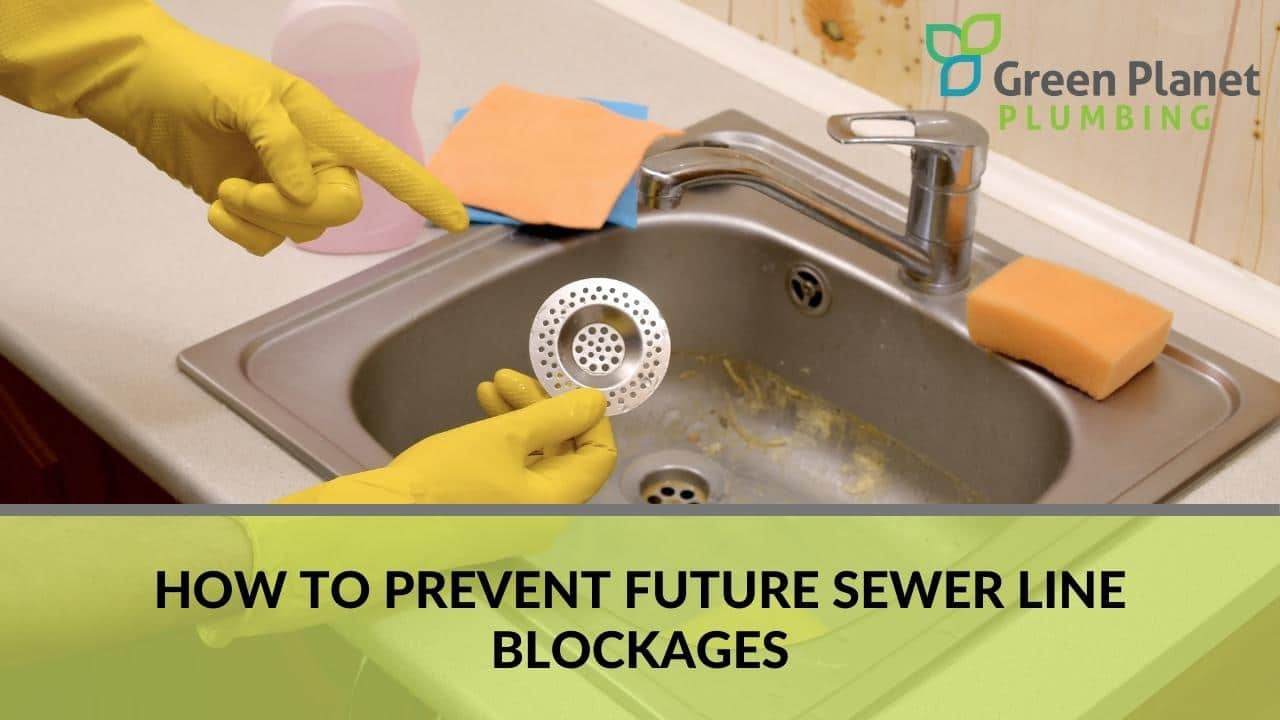
How to prevent future sewer line blockages
Once the blockage is fixed, it is necessary to take care of the plumbing and sewage system of the house. Here are some simple things that will help ensure that sewer lines are clear and working correctly:
Always put solid trash in the trash bin
Do not flush used toilet paper, tampons, sanitary napkins, and diapers. Plastics do not easily break down as organic waste materials do.
Use food strainers in the sink
When poured down the sink, food particles can add to the solid wastes that can block the sewer lines. Food strainers can help filter bigger food scraps and prevent them from going down the drain.
Use hair catchers in tubs and shower drain
Hair and other solid materials can go down the bathtub or shower drain, which may contribute to a sewer blockage. Hair catchers can help prevent this from happening.
Flush drains monthly
Fill up the sinks and tubs and let them drain on their own. It is a way of inspecting if blockages are starting to form down the drain or sewer lines. If the water drains freely, then the lines are clear. However, if the water drains slowly, this indicates that there may be a blockage down the line.
Address sewer problems immediately
Once problems start to become apparent, call a plumbing professional immediately. Having the problem addressed early in its progression can stop it from getting more serious and wreaking more havoc in the home. Of course, simpler issues are cheaper to repair than more complex ones. So, fix them while they are still easy to fix.
Regularly maintain and service the lines
Have the sewer lines inspected at least every 2 years. A plumbing professional can check the length of the line for any issues. Usually, they will clear the line through a drain cleaner or through jetting. Clearing the lines can help ensure that blockages are dealt with before they become serious.
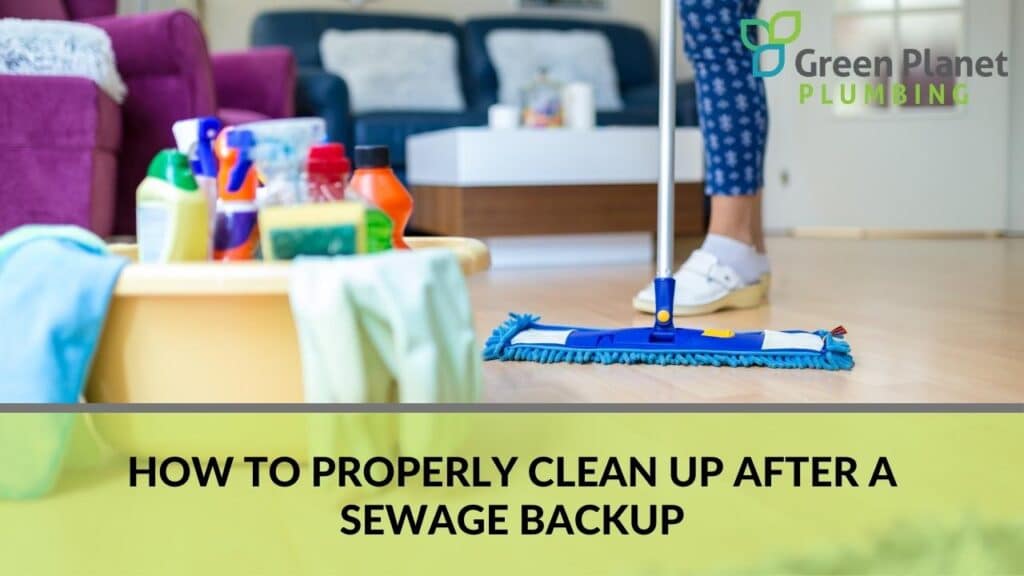
How to properly clean up after a sewage backup
A sewage backup is water contaminated by sewage wastes and contains many harmful bacteria and parasites. Cleaning up properly after the house is flooded by sewage water is essential for the health and safety of everyone in the house, however, take precautions to avoid direct contact with the sewage water as much as possible. Here are some tips on how to clean up after such an unfortunate event:
- Have carpets cleaned by cleaning professionals. Professionals can deeply clean carpets so that they are safe for use again.
- Wear protective gear, such as boots, gloves, and even rain gear.
- Protect any open wounds and wash immediately if backup water touches them.
- Wash all affected surfaces with hot and soapy water.
- Disinfect affected surfaces.
- Wash hands after cleaning up.
- Wash and disinfect cleaning supplies and clothes.
Contact Green Planet Plumbing for blocked sewers in Newcastle and Lake Macquarie
Green Planet Plumbing is equipped to deal with blocked pipes and sewer lines. Our team provides emergency plumbing services 24 hours a day, 7 days a week, serving both residential and commercial properties.
We offer jetting services and backflow prevention to ensure that your sewer and plumbing lines are clear. Call us now on (02)49119402 or email us at hello@greenplanetplumbing.com.au and let us talk about how we can serve you.

